TheRoundup is reader supported. We may earn a small commission when you make a purchase via links on this site, at no cost to you.
All products are personally reviewed and tested in accordance with our Review Methodology.

Are you looking for a rug for your living room or the high-traffic areas in your house, but worried about toxic chemicals?
Conventional rugs are often made from synthetic fibers and contain toxic dyes and flame retardants that can harm your health.
But there is an alternative.
Eco-friendly rugs are carpets made from sustainable, non-toxic materials, free from harmful chemicals, and produced using environmentally responsible methods.
Whether it's wool, jute, hemp, or organic cotton, I've found sustainable rug brands offering a choice of sizes and designs that look beautiful in any room in your home.
Today I'll show you exactly where to get them - at the lowest possible prices.

✔ Handwoven from Sustainable Materials
✔ Range of Size & Color Options
✔ WFTO Guaranteed
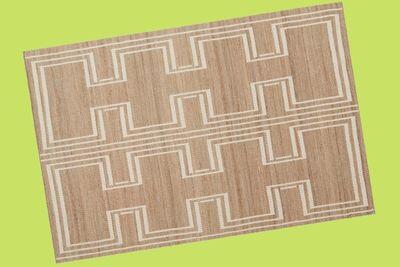
We Say: The Citizenry offers a large collection of rugs in different styles and sizes that are perfect for any eco-friendly home.
I tested The Citizenry’s Naira Rug which is sustainably made from 48% Jute, 42% Wool, and 10% Cotton. It makes an exquisite addition that will add warmth and texture to our living space while also making a bold statement.
Plus, you get the satisfaction of knowing it was handwoven in safe working conditions, as certified by the WFTO.
I especially love that it feels so soft and durable. It’ll surely last for years without fading or wearing out.
One thing to note, however, is that due to the size of this item, returns for a refund require a $65 total fee. For those looking for an exchange or store credit, though, it’s totally free.

✔ Made From Upcycled Materials
✔ Highest Quality
✔ Fair Wage
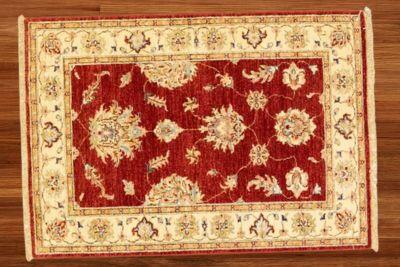
We Say: Ten Thousand Villages is another of my favorite online marketplaces giving independent producers the platform to sell their wares to a broader audience.
One such artisan-made rug on the Ten Thousand Villages platform is the Tribal Chobi Rug 3 (pictured above) made from 100% hand-spun wool.
This particular wool rug measures 2'9" x 3'11" (many other sizes are available in a variety of patterns and designs). It's colored using natural dyes such as roots, nuts, bark, dried flowers, and fruit. No chemicals in sight!
It seems extremely durable and is easy to care for. The instructions state it can be vacuumed or spot cleaned as needed using mild eco-soap and water, but only requires a major clean every 10-20 years - and this can also be done at home.
The range at Ten Thousand Villages primarily contains Persian and Oriental rugs which are perfect for making a grand statement in your living or dining room. They are unique, handmade from upcycled materials, and exceptionally well crafted.
They're not a cheap option, so if you have a limited budget I'd recommend Rugs USA. But for those who can afford to spend a little extra, these high-quality sustainable area rugs are well worth the money.

✔ Handmade in Small Batches
✔ Goodweave and C&F Certified
✔ Solar Powered Production
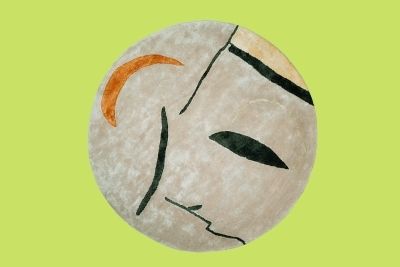
We Say: Mrs. Miller kindly bought a Taro Round Rug for her sister as a special birthday present. She's tested it and absolutely loves it.
Now that I have seen how it looks in their apartment, I wouldn’t hesitate to recommend it. In fact, I want one!
I love the abstract design and the wonderfully soft feel of the 100% bamboo silk. At 5' in diameter, it's big enough to make a real statement without being too overpowering.
If you like to walk around your house barefoot, then with a luxurious 5/8" pile height, this is certainly the perfect rug for you.
Is this style not to your liking? Cold Picnic has an extensive range of other designs, sizes, and shapes here.

✔ Natural Fibers
✔ Affordably Priced
✔ Free Carbon Offset Shipping
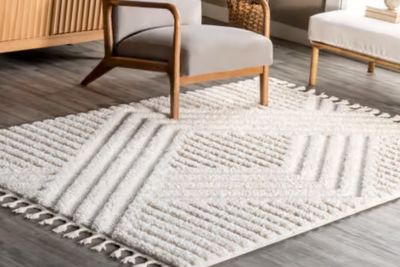
We Say: Over the last 20 years, Rugs USA has helped furnish more than a million households with premium washable rugs. So it's safe to say they know what they're talking about.
I loved the eco-friendly range, which contains a massive 274 designs, including possibly the best selection of jute rugs I've ever seen. They're made from naturally sourced fibers and even some recycled materials as well.
Other ranges contain synthetic fibers which are less sustainable, but even these are OEKO-Tex certified so you know there's no off-gassing of harmful substances.
The website is easy to use, with lots of useful filters to help you quickly and easily find the size and design you love.
The quality is great, the prices are right, and there's even a 30-day return policy so you can see your new rug in position before you decide if you want to keep it!

✔ OEKO-TEX Certified
✔ Fair Trade USA
✔ Handwoven Wool Rugs
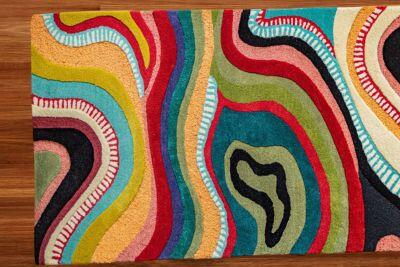
We Say: The Hand-Woven Wool Rug from YaYa & Co. that I originally tested is currently a bit of a sore subject in the Miller household.
Ours looked great in the living room, and with the OEKO-TEX and Fairtrade USA certifications, we thought we’d found a ‘forever rug’.
However, our loving labrador, Millie, took a very intense liking to the colorful pom poms.
Nothing we could do or say would stop her from sneaking off and trying to detach one to take to her bed as her new chew toy.
With a heavy heart, Mrs. M eventually decided the sensible option was to donate it to a close family friend.
At least she can now do and visit it every once in a while! ????
YaYa & Co. carries an extensive range of colorful rugs (you can view the full range here), so I doubt it’ll be long before a replacement is found. In fact, their Echo Organic rug has already caught my eye...
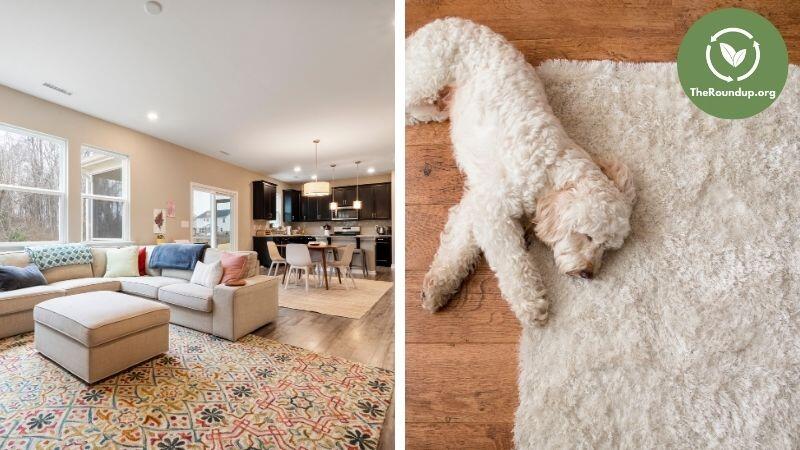
The most common material used to make many rugs is our old enemy plastic (polypropylene, for example).
It's fossil fuel based, and not biodegradable. In short - terrible for the environment.
Instead, choose natural rugs. These are made from natural and recycled materials and sustainable fabrics such as:
If you really do need to have plastic content (for use in outdoor rugs, for example), then at the very least, make sure it's made from recycled or repurposed plastic, not virgin plastic.
Most synthetic rugs are coated with a range of chemicals and synthetic dyes to keep them looking cleaner for longer.
That ‘box fresh’ smell is not as appealing as you might think. Volatile Organic Compounds (VOC) can be released from rugs and carpets into your home and reduce indoor air purity - as well as being harmful to your health.
A few things to look out for and potentially avoid are:
To protect yourself and your family from these chemicals and flame retardants, you should look for non-toxic rugs (like the ones I recommended above).
Eco-friendly floor rugs are made with natural materials - and that means zero harmful chemicals. Or, at the very least, dramatically reduced chemical levels.
An excellent way to tell which are non-toxic rugs (and which are not) is by looking out for accreditation to trusted organizations, such as GOTS, OEKO-TEX, and GreenGuard Gold.
Buying from a company that believes in ethical working practices ensures that no child labor has been used, and that everyone in the supply chain has been paid a fair price for their skills and/or materials.
The way to verify this is to look out for the Fair Trade Certified logo.
You can read a full breakdown of the benefits of eco-friendly rugs later, but for now, here's a quick overview.
If you're looking to buy a new rug and want to make sure it's environmentally friendly, you should follow these 5 simple steps. These are the same criteria my team and I used when testing rugs and finalizing our recommended brands for this list.
Look for rugs made from natural, renewable, or recycled materials. Wool, organic cotton, jute, sisal, and bamboo are good choices. These fibers are more sustainable and often biodegradable at the end of their life.
Find companies that focus on sustainability. Look for brands that use ethical labor practices and have a clear commitment to environmental responsibility. Certifications like the Global Organic Textile Standard (GOTS) can be a good indicator.
Choose a rug that's made to last. Sustainable doesn't just mean made from green materials; it also means buying less often. A durable rug reduces waste and saves resources in the long run.
Rugs colored with natural or low-impact dyes avoid harmful runoff and pollution associated with the manufacture of synthetic rugs. They're also less likely to contain allergens and toxic chemicals.
Consider what will happen to your rugs at the end of their life. Can they be recycled or composted? If you're not sure, check with the manufacturer.
Choosing a rug that can be easily disposed of in an eco-friendly way ensures that your purchase remains sustainable from start to finish.
The brands I tested all shipped their rugs with a care label. In the first instance, you should follow the manufacturer's instructions as these will give you care advice specific to your rug.
In the absence of a label, you can use these tips which will work for most sustainable rug materials.
Sustainable rugs, often made from natural fibers, need regular vacuuming - particularly if you have pets. This removes hair, dirt, and dust that can wear them out. Use a gentle setting to avoid damage.
If you get spills and stains, act fast to prevent them from soaking in. Blot, don't rub, with a clean, dry cloth. Use water or a mild detergent for cleaning. Avoid harsh chemicals that can harm natural fibers.
Rotate your rug every few months. This ensures even wear and prevents fading in one area from sunlight or foot traffic.
Rug pads prevent slipping and add cushioning. They also protect the rug and your floor. Choose a nontoxic rug pad to match your eco-friendly rug.
Keep your rug dry. Moisture can damage natural fibers and lead to mold and permanent stains. In damp areas, use a dehumidifier to protect your rug.
An organic weave refers to the weaving process where natural materials like jute, wool, cotton, or hemp are used to create rugs.
These rugs are often characterized by their irregularities and imperfections, which add to their charm and character.
Unlike machine-made rugs, organic weaves are made by skilled artisans who use traditional techniques to create unique designs.
Yes. Jute is an eco-friendly material, and, in the hands of a sustainable manufacturer, it makes an excellent natural fiber for rugs.
Whether you’re looking to add color to brighten up hardwood/tiled floors, or you need some daily fluffy heaven when you step out of the shower, zero-waste rugs form the foundation of a sustainable home.
Just maybe steer clear of pom poms if you have an inquisitive labrador in your life!
What are your preferred ethical rug brands? Have I missed your favorite floor covering?
Are floor coverings with organic cotton backing your thing? Or do you prefer more unusual materials, such as sisal, hemp, wool, or bamboo rugs? Drop me a line and let me know.

Our core values mean we always prioritize sustainability over profit. We carefully evaluate and personally test every product to ensure they meet our high standards. All products recommended in this article were tested in accordance with our Review Methodology.
TheRoundup.org - As Seen On
